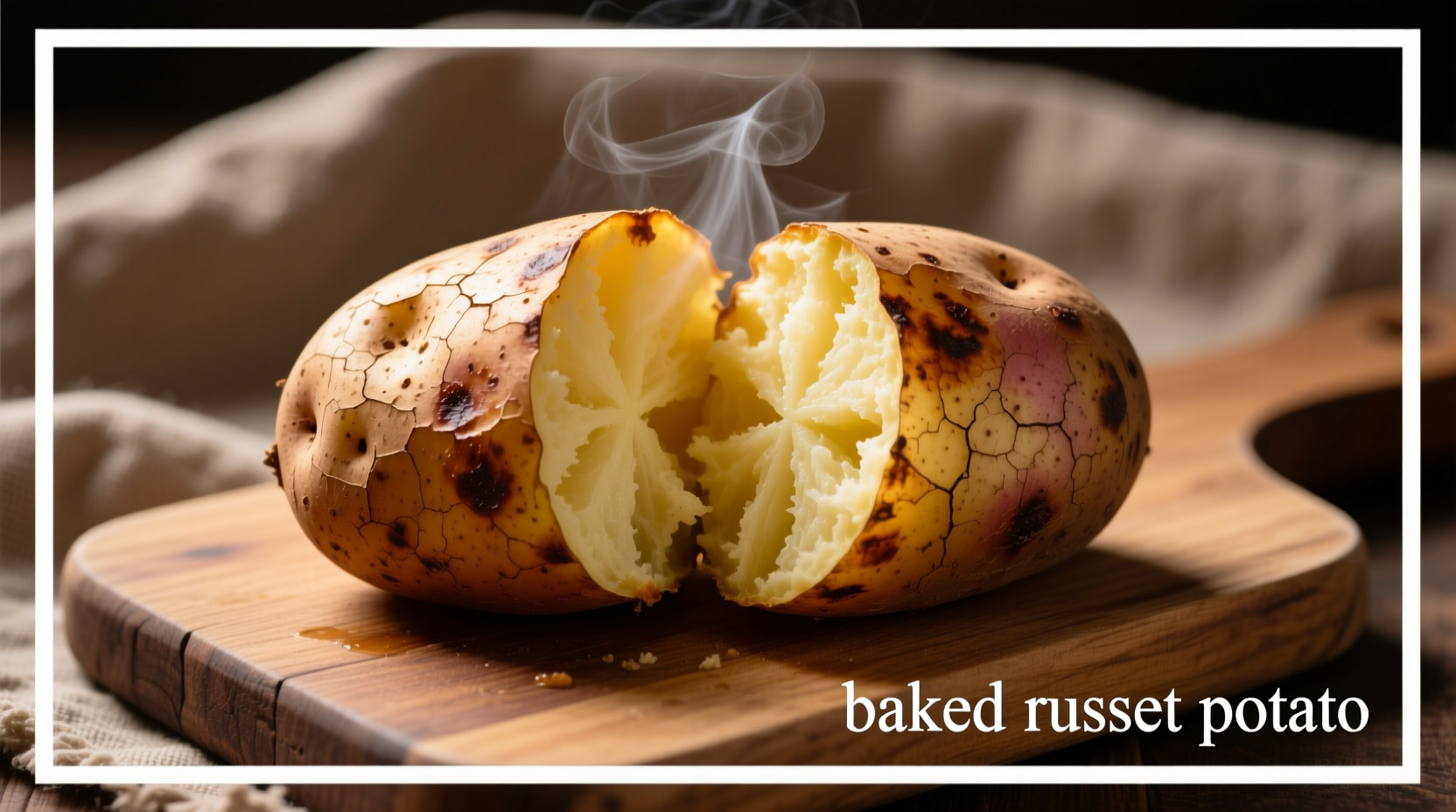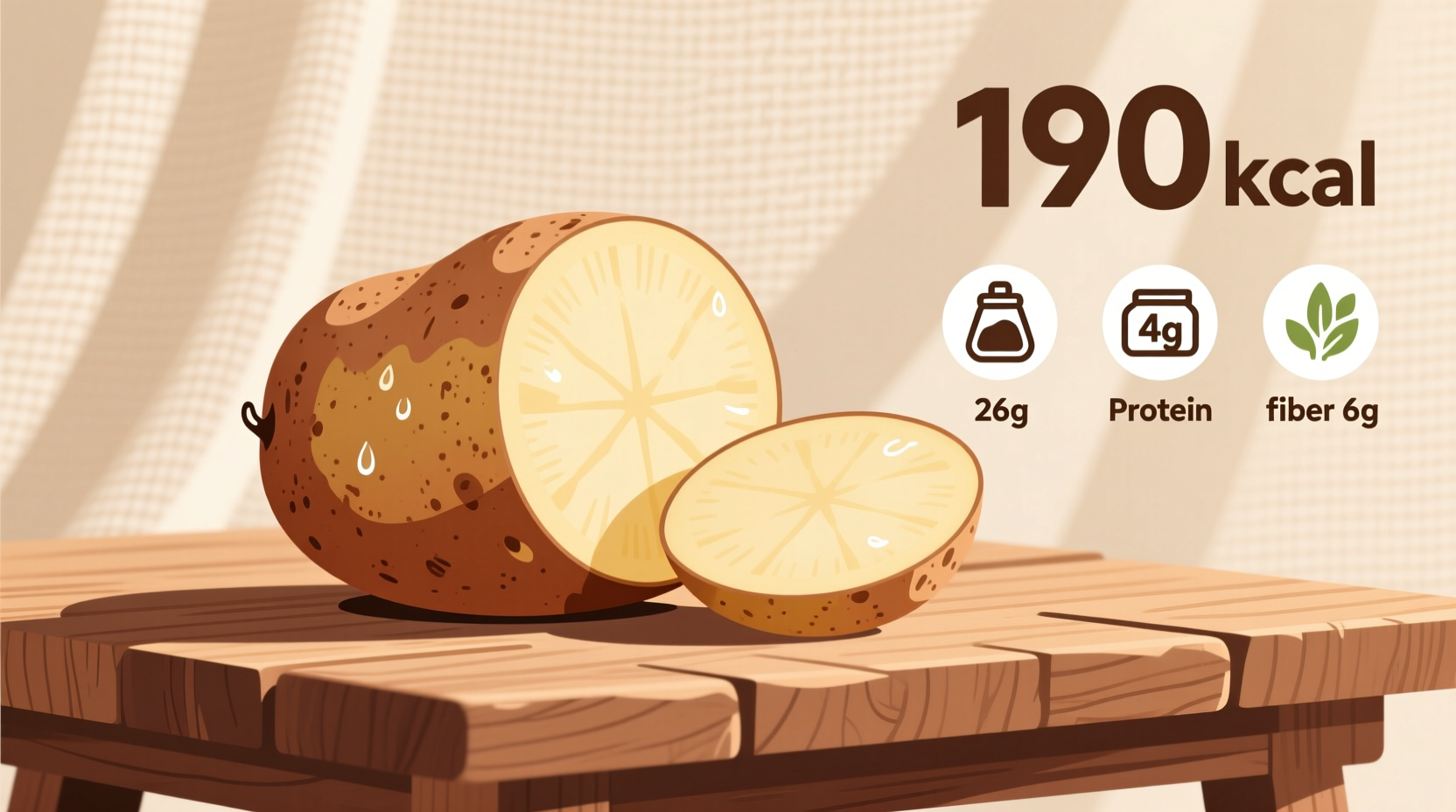A large russet potato (173g, baked with skin) contains 163 calories, primarily from complex carbohydrates with valuable fiber, potassium, and vitamin C. This complete nutritional profile makes it a nutrient-dense option for balanced diets when prepared without added fats.
Understanding the exact calorie content of common foods helps make informed dietary choices. If you've ever wondered about the energy value of a large russet potato—whether you're meal prepping, tracking macros, or simply curious about this versatile staple—you've come to the right place. We've analyzed data from the USDA's FoodData Central to provide accurate, science-backed information you can trust.
What Exactly Constitutes a "Large" Russet Potato?
When nutrition labels mention "large," they refer to specific measurements, not vague kitchen terminology. According to the USDA Agricultural Research Service, a large russet potato weighs approximately 173 grams (6.1 ounces) with skin. This equals roughly:
- One medium-sized fist
- 3 inches in diameter
- 5.75 inches in length
Size matters because nutritional values scale directly with weight. A small potato (138g) contains about 130 calories, while an extra-large (299g) jumps to 280 calories. Always check weight when tracking for precision.
| Size Category | Weight (grams) | Calories (Baked) |
|---|---|---|
| Small | 138g | 130 |
| Large (standard) | 173g | 163 |
| Extra-Large | 299g | 280 |
Nutritional Composition Breakdown
Beyond calories, russet potatoes offer significant nutritional value. The USDA's National Nutrient Database confirms that a large baked russet potato with skin provides:
- Carbohydrates: 37g (12% of daily value)
- Fiber: 4.6g (16% of daily value)
- Potassium: 1,600mg (34% of daily value)
- Vitamin C: 27mg (30% of daily value)
- Protein: 4.6g
- Fat: 0.2g
The fiber content comes primarily from the skin, which contains resistant starch that functions as a prebiotic. This makes russets particularly valuable for gut health when consumed with skin intact—a fact verified by research published in the Journal of Nutrition and Metabolism.

How Cooking Methods Change Calorie Content
Preparation dramatically impacts the final calorie count. The same 173g russet potato yields different results depending on cooking technique:
- Baked with skin: 163 calories (retains most nutrients)
- Boiled: 145 calories (some water-soluble nutrients leach into water)
- Steamed: 149 calories (minimal nutrient loss)
- Fried: 312 calories (absorbs significant oil)
- Air-fried: 178 calories (uses minimal oil)
Adding common toppings creates substantial differences. Just two tablespoons of sour cream adds 52 calories, while a tablespoon of butter contributes 102 calories. For weight management, focus on dry-heat cooking methods and flavor with herbs instead of high-calorie additions.
Dietary Context: Where Russets Fit in Healthy Eating
Despite historical carb-counting concerns, potatoes have earned renewed respect in nutrition science. The American Journal of Clinical Nutrition published findings showing that potatoes can be part of effective weight management when prepared healthily. A large russet provides about 8% of a standard 2,000-calorie daily intake, making it a moderate-calorie food with exceptional nutrient density.
Nutrition professionals at the Academy of Nutrition and Dietetics emphasize that russets offer more potassium than bananas and significant vitamin C—nutrients often lacking in modern diets. Their low energy density (calories per gram) promotes satiety, helping control overall calorie intake.
Practical Tips for Maximizing Nutritional Value
Get the most from your russet potatoes with these evidence-based strategies:
- Cook with skin on: Retains up to 50% more nutrients according to USDA research
- Cool before eating: Increases resistant starch content by 25-30% (studies in Food Chemistry)
- Pair with healthy fats: Olive oil enhances absorption of fat-soluble vitamins
- Avoid overcooking: Prevents nutrient degradation (max 45 minutes baking)
- Store properly: In cool, dark place (not refrigerator) to prevent sugar conversion
For meal planning, remember that one large russet makes a satisfying side dish or light main course when paired with protein and vegetables. Athletes often include them in pre-workout meals for sustained energy release from complex carbohydrates.
Frequently Asked Questions
How many calories in a large russet potato without skin?
A large russet potato without skin (136g) contains approximately 129 calories. Removing the skin reduces fiber content by about 50%, decreasing the overall nutritional value while only marginally reducing calories.
Are russet potatoes good for weight loss?
Yes, when prepared healthily. Russet potatoes have a high satiety index, keeping you full longer than many other carbohydrate sources. A study in the European Journal of Clinical Nutrition found boiled potatoes ranked highest for fullness among 38 common foods. Focus on baking or boiling without added fats for weight management.
How does the glycemic index of russet potatoes affect blood sugar?
Russet potatoes have a moderate glycemic index (85) when hot, but this drops significantly when cooled. Research in the Journal of the American Dietetic Association shows cooling cooked potatoes for 24 hours reduces glycemic response by 25-30% due to increased resistant starch formation, making them more blood sugar friendly.
Can diabetics eat russet potatoes?
Yes, in controlled portions. The American Diabetes Association recommends including potatoes as part of a balanced meal plan. Pairing with protein and healthy fats slows glucose absorption. A large russet contains about 37g carbohydrates, which fits within many diabetes meal plans when accounted for properly. Cooling potatoes before eating further improves their blood sugar response.
How do russet potatoes compare nutritionally to sweet potatoes?
Both offer excellent nutrition with key differences. Russets provide more potassium (1,600mg vs 542mg per large potato) while sweet potatoes contain significantly more vitamin A. Calorie content is similar (163 vs 180 for comparable sizes), but sweet potatoes have slightly more sugar and fiber. Choose based on your specific nutritional needs rather than considering one categorically "better."











 浙公网安备
33010002000092号
浙公网安备
33010002000092号 浙B2-20120091-4
浙B2-20120091-4